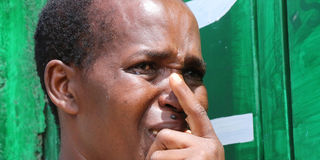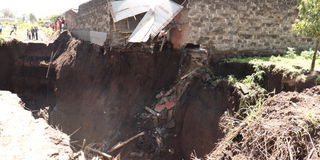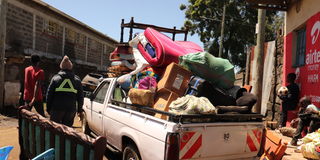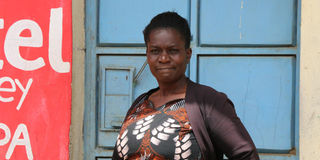Rift in the City: Fissures making families devastated, disoriented and homeless

Priscah Ambira, a former resident of Technology farm estate breaks down during an interview with Mtaa Wangu after leaving her house due to fissures.
A visit to the Technology estate in Kaptembwa ward, Nakuru West sub-county, and all one can hear is a creepy mix of graveyard silence dotted by scattered voices of children and adults.
The houses once built on believed solid ground have sunken more and abandoned structures continue to crumble like scenes from a post-apocalyptic film.
Neighbours watching others’ houses sink sit wondering if theirs’s will be next if it rains again.

Some of the houses destroyed by water and fissures at Technology farm in Kaptembwa ward.
For this community, nothing scares them more than seeing clouds gather announcing oncoming rain.
One by one, they pack their belongings in search of other homes.
Amid the sunken grounds, homeowners are grappling with demolishing their standing structures hoping to salvage materials for rebuilding elsewhere.
Priscah Ambira, notes having left her friend's house after hearing rumours of aid distribution to affected families. On arrival, she found no assistance available and lamented how some unaffected individuals have been exploiting the aid meant for genuine victims.
She’s now jobless and is dependent on aid from the government and well-wishers after she closed down her business, which she has run for over a decade when she and her neighbours were asked to move after a fissure (a long, narrow crack in the ground) developed in their residence.
“I have lived here for all my life. My children have known no other life. I’ve broken my back to ensure that my business stood on its feet and could support them,” the mother of three says.
Ambira notes that due to the sudden move by neighbours after raging waters sank several houses in and along their residence, she was forced to move hers and her children’s belongings including her stock for the shop to safer grounds in the neighbourhood only for some of it to be looted.

A resident packs their belongings ready to move after heavy rains caused fissures at Technology farm in Kaptembwa area.
“I cannot believe my life has been reduced to this,” she says with a low voice. “My children no longer stay with me and are being accommodated by a relative as I stay with a friend,” she covers her mouth with her shuka, trying to stifle a sob. The weight of her situation crashes down upon her, and she breaks down completely.
We pause as she struggles to regain composure.
“I've been reduced to a life of borrowing from being completely independent.”
Ambira tells Mtaa Wangu she's currently in the process of organizing her life by looking for a job to support herself and her children. "It's not easy," she admits.
Trizer Kataka portrays a much more positive attitude despite the loss.

Tiger Kataka, a former resident of Technology farm estate during an interview with Mtaa Wangu.
She even encourages Ms. Ambira that loss is sometimes a part of life and is grateful that no lives were lost despite the abrupt disruption.
According to Ms. Kataka, who, like Ambira, has lived in the area for over a decade this place is the only home she has ever known.
“We'd seen signs from the cracks on some of the houses, but we never really paid attention to them. At that time, we thought this would barely affect us, only for the house nearby to cave in. The water led to unstable ground, which caused the sinking of other houses,” she says.
She recalls panick and frenzy in the air as everyone ran for safety while trying to account for their children.
“There was chaos everywhere. People were shouting, ‘Kimbia! Tokeni! Manyumba zinabebwa na maji!' Parents were frantically calling for their children. It was terrifying. We were all running, not knowing where it was safe or if the catastrophe would follow us to safety.”
Despite having to start over Ms. Kataka says she has no other option.
“I’ve had to move my family to a new rental house as we try to put our lives back together. My husband and I had a plan of running our business and paying back our debt, but now, with everything that's happened, our debt has only increased. It's incredibly strenuous,” says the mother of three.
“I am glad to be alive though. I am glad that no lives were lost that day. We can replace the property we own but we can’t replace lives,” Ms Kataka says gratefully.
While Ms. Ambira seems quite doubtful about regaining her previous life, Kataka, on the other hand, is more hopeful that things will fall into place.
Once united by shared experiences and daily interactions, Ambira, Kataka, and the rest now find themselves isolated in unfamiliar surroundings as they try to find a sense of belonging.
Despite government efforts and promises to help families from Technology estate rebuild their lives, a once close-knit neighbourhood has been left in tatters.
